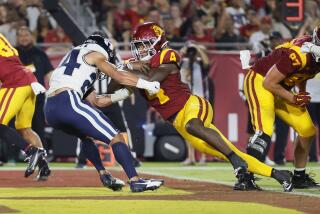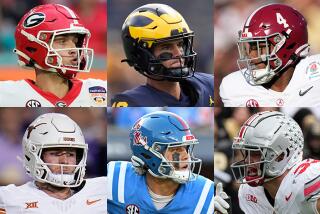Background Computer Stories of BCS
- Share via
Miami beat Florida State by a field goal last year in one of college football’s most enthralling and defining games, but some people just couldn’t be bothered.
David Rothman, one of eight bowl championship series computer operators helping to determine the national title game participants, chose to attend a seminar at UCLA that day rather than watch the game.
“People don’t understand,” he says, “we have standings. I don’t have to watch a minute of football. That’s the whole point of having an objective system. I could be dead and gone and it wouldn’t matter.”
Besides, he adds, jokingly, “many of those seminars are free meals.”
Florida State finished No. 2 in the final BCS standings, edging Miami out of a national title game berth by .32. Five of the eight BCS computers had Florida State ranked No. 1.
His final standings had Florida State No. 2 and Miami No. 3, even though both schools each had one defeat and Florida State defeated Miami in the head-to-head matchup.
In the rancorous BCS business, this is considered progress.
You can bet there will be more controversies Monday when the BCS releases its first standings. (Sneak peek: UCLA is No. 2 in the unofficial standings and No. 1 in five of eight BCS computers).
In an effort to more equitably determine the national title game matchup in a nonplayoff world, college football commissioners in 1998 came up with the BCS, a four-pronged format designed to resolve the often comical divisions in the writers’ and coaches’ polls.
The BCS standings meld the average of the writers’ and coaches’ polls, strength of schedule, losses and a computer component.
There were three computer ratings the first year--Jeff Sagarin, Anderson & Hester/Seattle Times and New York Times--but the BCS beefed the total to eight in 1999 when it was clear the computers had garnered disproportional power and the sport was ceding to a higher power, namely Sagarin.
As the first BCS standings draw near in a sport where fractions have become as important as the footballs, the question begs: Who are these guys with the pocket calculators?
First, some housekeeping. Last year’s Miami-Florida State controversy prompted change. The BCS bosses gave the boot to the New York Times and Dunkel systems, apparently for not altering their systems to remove margin of victory, and replaced those indexes with those offered by Wes Colley and Peter Wolfe.
They join Rothman, Sagarin, Anderson & Hester/Seattle Times, Richard Billingsley, Herman Matthews (Scripps Howard) and Kenneth Massey in the BCS lineup.
While these men may not cut the swath of, say, the Mercury astronauts, this is an eclectic ensemble, all of whom resent the “computer geek” rap.
Colley has a doctorate in astrophysical sciences from MIT and works as a missile tracker. Wolfe is a physician and associate professor at UCLA--”yep,” he says, “I’m a Bruin fan”--who specializes in infectious diseases.
Nerd?
“I don’t think so,” Wolfe says. “I have a laptop, wear a stethoscope around my neck and have a beeper, but I don’t have a plastic pen guard.”
Wolfe does have this peculiar hobby. He loves to collect football scores. He tracks down 320 every weekend during the season, staying up all hours to pin down that Worcester State-Framingham final.
Not shockingly, most of the BCS men have math backgrounds. Rothman is a retired mathematician and statistician, Matthews teaches mathematics in Tennessee, Sagarin attended MIT, and Massey is a doctoral candidate in the math department at Virginia Tech.
Billingsley, however, is in the stress management business but worked his way into the BCS on the strength of 30 years of rankings history.
Jeff Anderson of Anderson/Hester teaches political science at the Air Force Academy while his poll partner, Chris Hester, is a sports play-by-play announcer in the Seattle area.
Most have an affinity for college football, although Rothman admits he is only a casual fan and has not attended a game in years.
The eight computer polls were selected by the BCS, with Southeastern Conference associate commissioner Charles Bloom doing the bulk of original legwork.
When the BCS expanded from three computers to eight, Bloom pored over dozens of football ranking systems wishing to become part of the BCS.
Among the systems rejected by Bloom and SEC Commissioner Roy Kramer were “Spanky’s”, “Flyman’s” and one offered by the Los Angeles Times.
Bloom says he scoured the Internet and NCAA record books for polls with integrity and history. The weekly BCS standings cannot be compiled until all eight computer rankings are posted.
“No one’s ever called in sick, and no one’s ever been late,” Bloom says.
The BCS does not pay the systems operators; there are no contracts signed.
“Not even a handshake,” Wolfe says.
The common thread?
“All of them are very computer literate, all enjoy math and they all love college football,” Bloom says.
The computer component was added to provide a dispassionate element to the national title process. Few could deny the Associated Press poll and the ESPN/USA Today rankings are inherently and sometimes uproariously skewed. The polls have been at warring odds since 1954, the first time there was a split champion (the UPI coaches picked UCLA; the AP sided with Ohio State).
Writers are prone to regional preferences, while coaches, who don’t reveal their votes, are famous for boosting the ranking of an upcoming opponent or punishing a coach they don’t like (See Steve Spurrier, Florida Gators, 1995 final poll).
But how do we know the computers are unbiased?
Sagarin, for one, refuses to release his formula.
“This is how I make my living and have done so since 1972,” Sagarin says. “I would never give it to anyone else. I could care less what others do with their systems.”
That said, Sagarin seemed to have an infatuation with Kansas State in 1998, and other systems have been prone to interesting, if only coincidental, leanings.
For example, Hester and Anderson are University of Washington graduates. Guess which team debuted at No. 1 in their rankings on Sept. 30?
Washington.
The same week, the Hester/Anderson had five Pac-10 teams in its top 10.
Anderson responded to an e-mail query by saying his ratings are heavily influenced by conference performance, and this year the Pac-10 is the strongest conference. He also said this was the first time in the eight years of the Seattle Times poll that Washington had been ranked No. 1.
Colley’s debut rankings touted South Carolina No. 1. Interesting, given Colley is an unabashed SEC fan, his brother having played at Georgia, and that he is poll partners with the Atlanta Journal Constitution. Update: South Carolina has dropped to No. 15 in Colley’s poll and UCLA is No. 1.
Some of the early computer rankings are just, well, kooky.
Last week, Matthews had Division 1-AA school Georgia Southern ranked higher than half the schools in the Big East and higher than five schools in the SEC and Big 12.
The Seattle Times this week has Florida ranked No. 31 and Iowa State at No. 15; Middle Tennessee State at No. 24 and Notre Dame at 67.
Massey has been accused in the past of favoring Virginia Tech, but this week his Hokies are a dismal No. 14.
Sagarin’s system, the only one to predict margin of victory, last week noted Division 1-AA Harvard would have been a half-point favorite over Notre Dame on a neutral field.
Bloom says there are quirks in the early computer readings because not enough games have been played; it’s the reason the BCS does not release its first standings until October.
Wolfe will not release his first standings until this week.
“Starting this early is awkward,” Wolfe says. “It’s like asking a builder if a house half-constructed is livable. ....Of course not. Will it be? Yes.”
Wolfe says he thinks the BCS rankings are upstanding. Sagarin aside, the other poll operators make their formula available--if you have the inclination to crunch the numbers.
“I know all the guys except for Anderson/Hester, and they’re all real remarkable nice guys,” Wolfe says. “I doubt there’s any funny business going on, but there’s always the perception.”
Some consider being a BCS cast member a higher calling.
Rothman says he is a statistician, not a nerd, but you be the judge.
He is single, 66, and has lived in the same South Bay apartment since 1974. He drives a 1981 vehicle. He lived so frugally while working as a statistician in the defense industry, he once carried around 19 uncashed paychecks in his wallet. He retired in 1986 to pursue his passions for genealogy, constitutional reform, seminars and promoting the football rankings system he first developed in 1963.
Rothman also has an ax to grind. Years ago, his rankings system was coldly rejected by then-NCAA Executive Director Walter Byers.
In a letter, Byers wrote: “Mr. Rothman, we will never do standings at the NCAA and second, we will never do yours.”
Rothman says he is on a “crusade” to prove his rankings are superior.
In a sense, this is “Revenge of the Nerds.”
“I consider the NCAA negligent,” Rothman says. “Instead of finding good standings, they either ignore, or put out the RPI (Ratings Percentage Index), which is a farce. The RPI is garbage. The only reason the BCS has arisen is because of the vacuum produced by the NCAA.”
Safe to say few among us have harbored such statistical hatred.
Rothman is no one-trick pony, though. He is a budding expert on genealogy and helped research a book on the Marx Brothers.
He lives by a simple creed: “There is nothing like a good seminar or a gorgeous woman.”
Yet, fall weekends are devoted to the statistical sciences, Dr. Footballstein dumping scores into his BCS paradigm.
Rothman’s system allows for no outside influences for games played, no edge given for home field or tradition.
So when you question why Rothman had Division II Grand Valley State rated ahead of Michigan, he assures you it will all work out in the end.
“I argue my system is the one the BCS should use--period,” he says.
More to Read
Go beyond the scoreboard
Get the latest on L.A.'s teams in the daily Sports Report newsletter.
You may occasionally receive promotional content from the Los Angeles Times.











